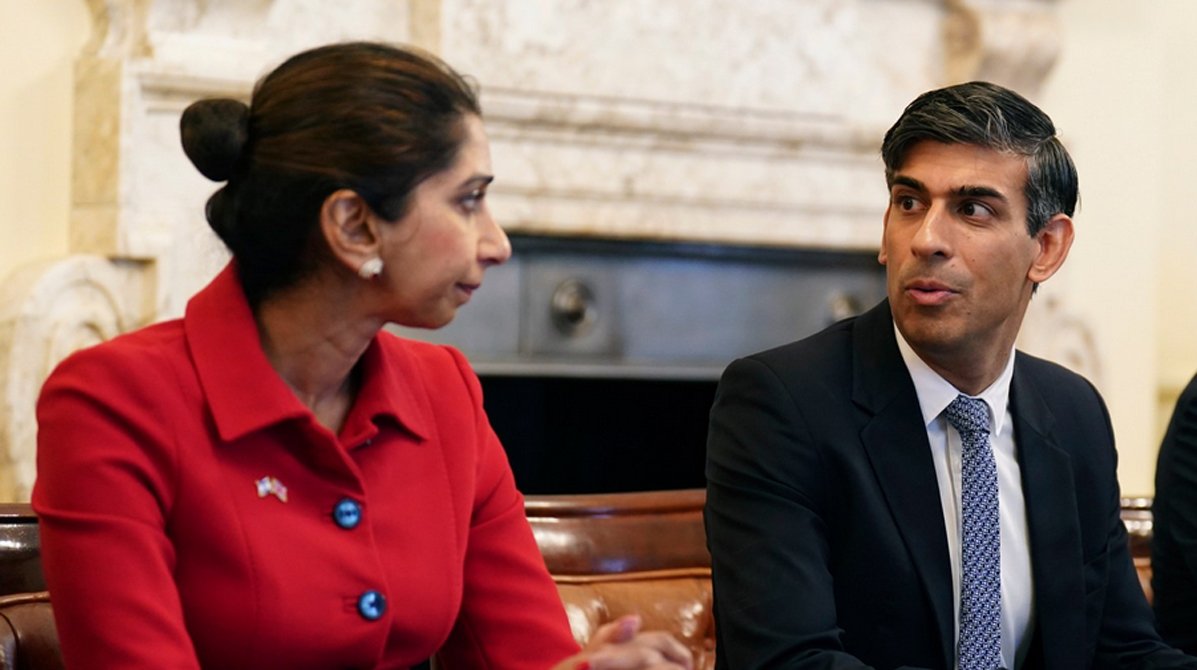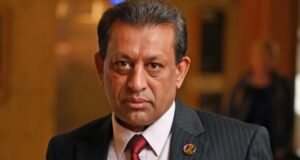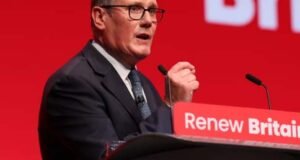
Prime Minister Rishi Sunak promised to toughen up migration rules under a Tory leadership contest deal with Suella Braverman, the former home secretary’s allies say.
The Telegraph newspaper says it has seen a copy of a plan Mr Sunak agreed with Mrs Braverman last year.
The document includes a pledge to increase the salary migrants would have to earn to enter the UK.
But Mr Sunak’s allies dispute the idea he struck a deal with Mrs Braverman.
Sources close to the prime minister insist there was a more general policy discussion about legal and illegal migration, rather than an agreement on specific policy proposals.
The claim of a deal came in Mrs Braverman’s scathing letter to Mr Sunak after the prime minister had sacked her as home secretary.
In the letter, Mrs Braverman said she supported Mr Sunak’s Tory leadership bid last year because of “the firm assurances you gave me on key policy priorities”, which included reducing “overall legal migration”.
The Telegraph reported that it had seen “a copy of the pact” over the weekend, days after official figures showed net migration into the UK reached a record 745,000 last year.
The figures represent a challenge for the prime minister, whose party has repeatedly promised to reduce the numbers during its 13-year stint in power.
Mr Sunak has faced pressure from his own MPs to bring down net migration, which is the difference between the number of people coming to live in the UK and those leaving.
When asked about the figures on Monday, the prime minister said he was clear net migration was “too high” and it needed to “come down to sustainable levels”.
He said restricting some foreign postgraduate students from bringing family members to the UK – a move announced in May – had been a significant move.
But he did not comment on a proposal to raise the salary threshold for skilled foreign workers from £26,000 to £40,000.
This proposal was in the four-point migration plan agreed by Mrs Braverman and Mr Sunak, according to the Telegraph.
The document also contains other ideas, such as closing down the graduate visa route, and prioritising Russell Group university applicants when evaluating student visa applications.
Allies of the former home secretary claim the prime minister to agreed to implement this plan.
Mr Sunak previously said he had conversations with lots of people during the leadership contest, not just Mrs Braverman.
Mr Sunak’s allies also point out that while Mrs Braverman was home secretary, the government did cut the number of dependents some students were able to bring with them.
Last week, Immigration Minister Robert Jenrick shared a set of proposals to attempt to cut immigration with No 10, which are being discussed internally.
Among the suggestions was a required minimum annual salary of £35,000 in order to receive a work visa.
But this will be another unwelcome intervention from Mrs Braverman when he is under pressure from some restless Conservative MPs over net migration numbers.
Separately, many Conservative MPs also want swift action to rescue the government’s plan to send some asylum seekers to Rwanda.
The policy was ruled unlawful by the Supreme Court earlier this month.
The prime minister’s spokesman said while the Rwanda plan was “a crucial part of our approach to stopping the boats”, there “is no one silver bullet”.
“And that’s why we – alongside the continued work to secure the Rwanda migration partnership – we are taking action, whether that’s on bilateral returns agreements, further co-operation with our French counterparts, and that is having an impact,” the spokesman said.
Mr Sunak has promised an upgraded treaty with Rwanda on the asylum plan and a law intended to set aside the Supreme Court’s ruling.
But the prime minister’s spokesman declined to comment on the timeline of a new treaty with Rwanda amid speculation over the reason for its delay.
“It’s due to be published in the coming weeks,” the spokesman said.
 Weekly Bangla Mirror | Bangla Mirror, Bangladeshi news in UK, bangla mirror news
Weekly Bangla Mirror | Bangla Mirror, Bangladeshi news in UK, bangla mirror news







